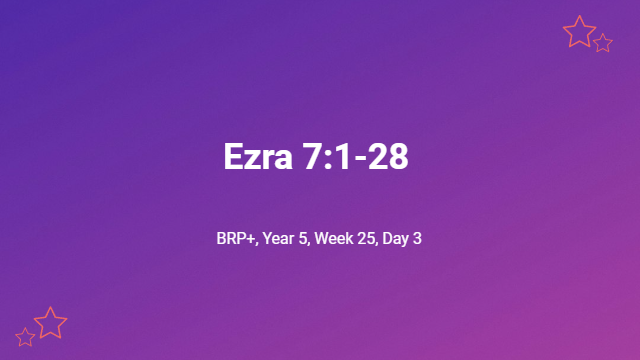Ezra 7:1-28
Q.1. What were Ezra’s credentials? How easily was this trip accomplished? Who went with Ezra? What was the reason why Ezra went to Jerusalem? – (Ezra 7:1-12)
Ezra was not just a highly regarded priest, but his genealogy traced all the way back to Aaron the first High Priest (Ezra 7:1-5). As well, Ezra had earned the respect of Artaxerxes, king of Persia – This Ezra went up from Babylon, and he was a scribe skilled in the law of Moses, which the Lord God of Israel had given; and the king granted him all he requested because the hand of the Lord his God was upon him… Now this is the copy of the decree which King Artaxerxes gave to Ezra the priest, the scribe, learned in the words of the commandments of the Lord and His statutes to Israel … to Ezra the priest, the scribe of the law of the God of heaven… (Ezra 7:6 & 11). He was accompanied by Israelites, including priests, Levites, singers, gatekeepers, and temple servants, on his mission trip to Jerusalem (Ezra 7:7). All up, the journey took 4 months of solid travel – … because the good hand of his God was upon him (Ezra 7:9). For Ezra had set his heart to study the law of the Lord and to practice it, and to teach His statutes and ordinances in Israel (Ezra 7:10). He had a clear purpose that highlighted three truths for us to apply: Firstly, he set his heart to study the Word for himself. Secondly, he set his heart to practice and model it. Thirdly, he set his heart to teach it to his people. We can’t hope to instil in others, what we do not have ourselves.
Q.2. What authority was Ezra granted? How highly was he respected by the king? What additional benefits did Ezra bring to Jerusalem? – (Ezra 7:11-20)
Artaxerxes gave Ezra sweeping authority to lead a second return of any exiles – … who are willing to go to Jerusalem … (Ezra 7:13), in response to his requests. He was given silver and gold by the king and his seven counsellors. This was to be added to the freewill offerings and money for sacrifices given by the Israelites in Babylon, to be used upon their return (Ezra 7:15-17). In fact, Ezra was given free rein to use the bounty in whatever way he thought appropriate (Ezra 7:18). This showed complete trust in the integrity of Ezra. He also took more sacred utensils, and an amazingly generous offering to supply – the rest of the needs for the house of your God, for which you may have occasion to provide, provide for it from the royal treasury (Ezra 7:20).
Q.3. What further provisions and prohibitions were made? Why? How extensive was the support for the mission of Ezra? – (Ezra 7:21-26)
The returnees had faced much opposition. This had probably been communicated to Ezra. Therefore, in his decree, Artaxerxes also ensured that the treasurers beyond the Euphrates River would submit to any requests that Ezra might make of them (Ezra 7:21-22). Why did the king make this demand? – Whatever is commanded by the God of heaven, let it be done with zeal for the house of the God of heaven, so that there will not be wrath against the kingdom of the king and his sons (Ezra 7:23). King Artaxerxes had sufficient fear of Ezra’s God, that he sought His blessing. He also exempted God’s servants from paying any tax, toll, or tribute (Ezra 7:24). He encouraged Ezra to judge his people, and to teach God’s law to – anyone who is ignorant of them (Ezra 7:25). He also gave him authority to punish, banish, or confiscate from any who would not submit to his teaching (Ezra 7:26). What a turn-around.

